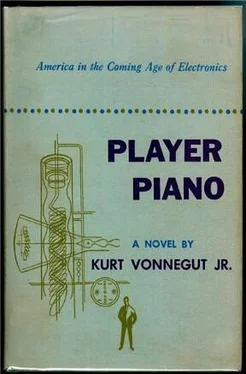Through the war, and through the postwar years to the present, EPICAC's nervous system had been extended outward through Carlsbad Caverns - intelligence bought by the foot and pound and kilowatt. With each addition, a new, unique individual had been born, and now Halyard, the Shah, and Khashdrahr were arriving at the bunting-covered platform, where the President of the United States of America, Jonathan Lynn, would dedicate to a happier, more efficient tomorrow, EPICAC XIV.
The trio sat down on folding chairs and waited quietly with the rest of the distinguished company. Whenever there was a break in the group's whispering, EPICAC's hummings and clickings could be heard - the sounds attendant to the flow of electrons, now augmenting one another, now blocking, shuttling through a maze of electromagnetic crises to a condition that was translatable from electrical qualities and quantities to a high grade of truth.
EPICAC XIV, though undedicated, was already at work, deciding how many refrigerators, how many lamps, how many turbine-generators, how many hub caps, how many dinner plates, how many door knobs, how many rubber heels, how many television sets, how many pinochle decks - how many everything America and her customers could have and how much they would cost. And it was EPICAC XIV who would decide for the coming years how many engineers and managers and research men and civil servants, and of what skills, would be needed in order to deliver the goods; and what I.Q. and aptitude levels would separate the useful men from the useless ones, and how many Reconstruction and Reclamation Corps men and how many soldiers could be supported at what pay level and where, and . . .
"Ladies and Gentlemen," said the television announcer, "the President of the United States."
The electric car pulled up to the platform, and President Jonathan Lynn, born Alfred Planck, stood and showed his white teeth and frank gray eyes, squared his broad shoulders, and ran his strong, tanned hands through his curly hair. The television cameras dollied and panned about him like curious, friendly dinosaurs, sniffing and peering. Lynn was boyish, tall, beautiful, and disarming, and, Halyard thought bitterly, he had gone directly from a three-hour television program to the White House.
"Is this man the spiritual leader of the American people?" asked Khashdrahr.
Halyard explained the separation of Church and State, and met, as he had expected to meet, with the Shah's usual disbelief and intimations that he, Halyard, hadn't understood the question at all.
The President, with an endearing, adolescent combination of brashness and shyness, and with the barest trace of a Western drawl, was now reading aloud a speech someone had written about EPICAC XIV. He made it clear that he wasn't any scientist, but just plain folks, standing here, humble before this great new wonder of the world, and that he was here because American plain folks had chosen him to represent them at occasions like this, and that, looking at this modern miracle, he was overcome with a feeling of deep reverence and humility and gratitude . . .
Halyard yawned, and was annoyed to think that Lynn, who had just read "order out of chaos" as "order out of koze," made three times as much money as he did. Lynn, or, as Halyard preferred to think of him, Planck, hadn't even finished high school, and Halyard had known smarter Irish setters. Yet, here the son-of-a-bitch was, elected to more than a hundred thousand bucks a year!
"You mean to say that this man governs without respect to the people's spiritual destinies?" whispered Khashdrahr.
"He has no religious duties, except very general ones, token ones," said Halyard, and then he started wondering just what the hell Lynn did do. EPICAC XIV and the National Industrial, Commercial, Communications, Foodstuffs, and Resources Board did all the planning, did all the heavy thinking. And the personnel machines saw to it that all governmental jobs of any consequence were filled by topnotch civil servants. The more Halyard thought about Lynn's fat pay check, the madder he got, because all the gorgeous dummy had to do was read whatever was handed to him on state occasions: to be suitably awed and reverent, as he said, for all the ordinary, stupid people who'd elected him to office, to run wisdom from somewhere else through that resonant voicebox and between those even, pearly choppers.
And Halyard suddenly realized that, just as religion and government had been split into disparate entities centuries before, now, thanks to the machines, politics and government lived side by side, but touched almost nowhere. He stared at President Jonathan Lynn and imagined with horror what the country must have been like when, as today, any damn fool little American boy might grow up to be President, but when the President had had to actually run the country!
President Lynn was explaining what EPICAC XIV would do for the millions of plain folks, and Khashdrahr was translating for the Shah. Lynn declared that EPICAC XIV was, in effect, the greatest individual in history, that the wisest man that had ever lived was to EPICAC XIV as a worm was to that wisest man.
For the first time the Shah of Bratpuhr seemed really impressed, even startled. He hadn't thought much of EPICAC XIV's physical size, but the comparison of the worm and the wise man struck home. He looked about himself apprehensively, as though the tubes and meters on all sides were watching every move.
The speech was over, and the applause was dying, and Doctor Halyard brought the Shah to meet the President, and the television cameras nuzzled about them.
"The President is now shaking hands with the Shah of Bratpuhr," said the announcer. "Perhaps the Shah will give us the fresh impressions of a visitor from another part of the world, from another way of life."
" Allasan Khabou pillan? " said the Shah uncertainly.
"He wonders if he might ask a question," said Khashdrahr.
"Sure, you bet," said the President engagingly. "If I don't know the answers, I can get them for you."
Unexpectedly, the Shah turned his back to the President and walked alone, slowly, to a deserted part of the platform.
"Wha'd I do wrong?" said Lynn.
"Ssssh!" said Khashdrahr fiercely, and he placed himself, like a guard, between the puzzled crowd and the Shah.
The Shah dropped to his knees on the platform and raised his hands over his head. The small, brown man suddenly seemed to fill the entire cavern with his mysterious, radiant dignity, alone there on the platform, communing with a presence no one else could sense. "We seem to be witnessing some sort of religious rite," said the announcer. "Can't you keep your big mouth shut for five seconds?" said Halyard. "Quiet!" said Khashdrahr. The Shah turned to a glowing bank of EPICAC's tubes and cried in a piping singsong voice:
Allakahi baku billa,
Moumi a fella nam;
Serani assu tilla,
Touri serin a sam."
"The crazy bastard's talking to the machine," whispered Lynn.
"Ssssh!" said Halyard, strangely moved by the scene.
" Siki? " cried the Shah. He cocked his head, listening. " Siki? " The word echoed and died -lonely, lost.
" Mmmmmm, " said EPICAC softly. " Dit, dit. Mmmmm. Dit. "
The Shah sighed and stood, and shook his head sadly, terribly let down. " Nibo, " he murmured. " Nibo. "
"What's he say?" said the President.
" 'Nibo ' - ' nothing. ' He asked the machine a question, and the machine didn't answer," said Halyard. " Nibo. "
"Nuttiest thing I ever heard of," said the President. "You have to punch out the questions on that thingamajig, and the answers come out on tape from the whatchamacallits. You can't just talk to it." A doubt crossed his fine face. "I mean, you can't, can you?"
Читать дальше








![Курт Воннегут - Вампитеры, фома и гранфаллоны [litres]](/books/397997/kurt-vonnegut-vampitery-foma-i-granfallony-litre-thumb.webp)